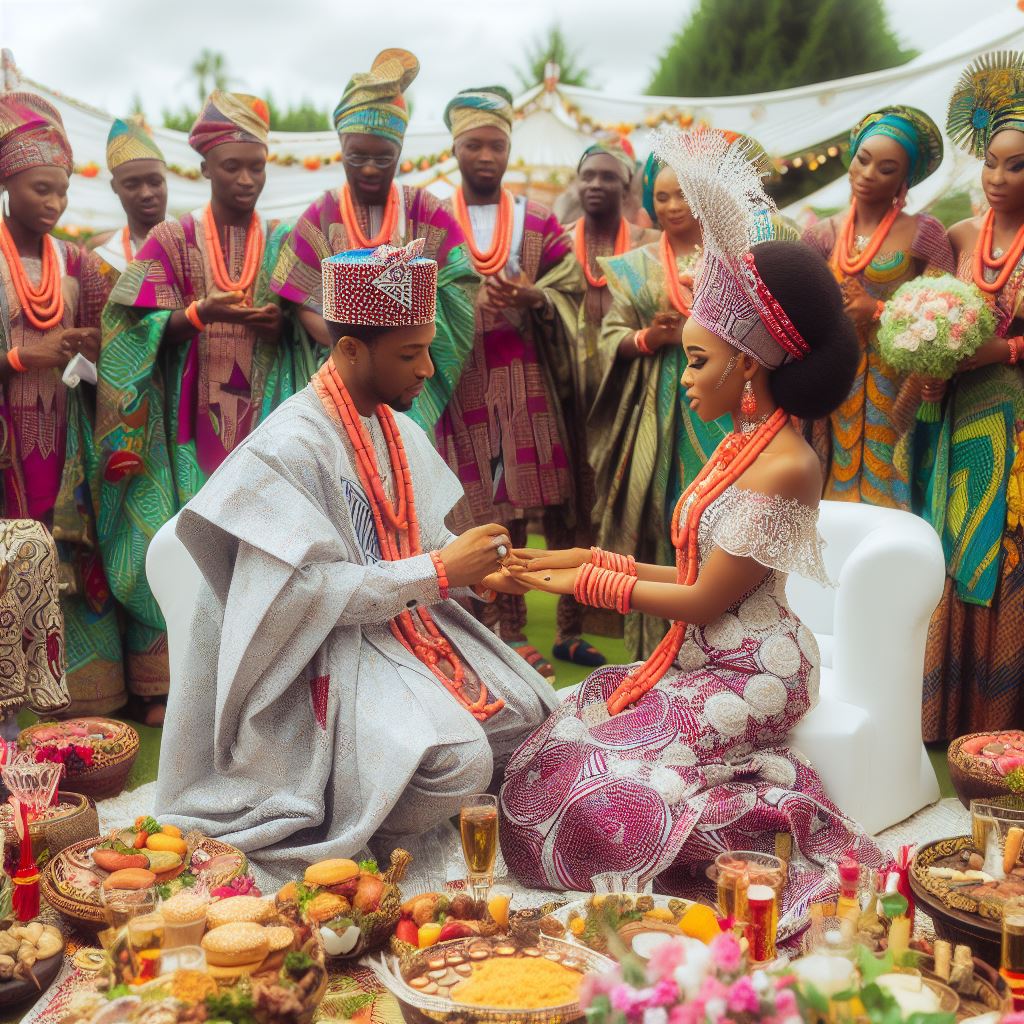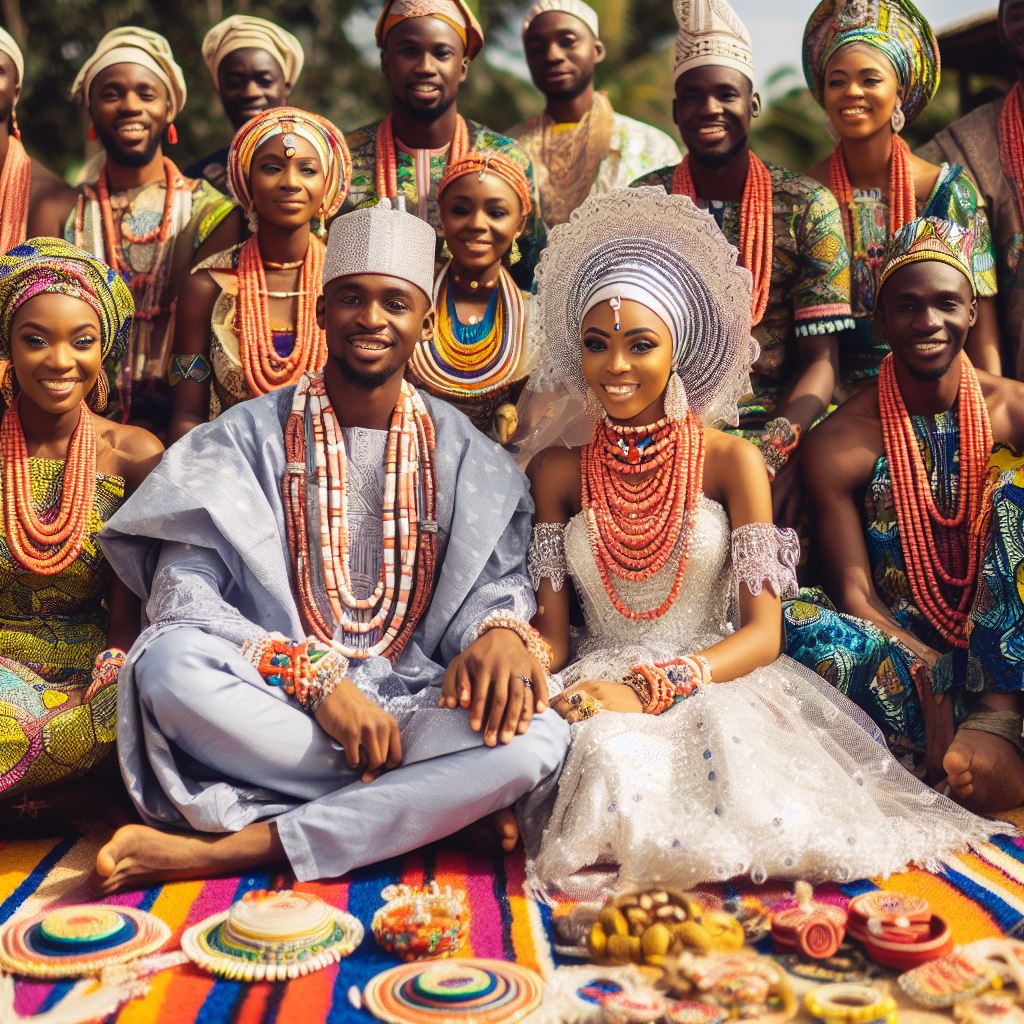Introduction
Marriage laws and regulations play a crucial role in Nigerian society.
A. Importance of Marriage Laws
Understanding Nigerian marriage laws is crucial to ensure your union is legal, protected, and respectful of cultural diversity.
B. Purpose of the Blog Post
This blog post aims to enlighten Nigerians about the legal aspects of marriage, promoting informed decisions and happy unions.
C. Key Points to Be Discussed
- Legal Age and Consent
- Types of Marriages Recognized
- Marriage Registration Process
- Matrimonial Property Regimes
- Divorce and Separation
- Cultural and Religious Practices
Prepare to navigate the intricate web of marriage laws in Nigeria with confidence.
Types of Marriages Recognized in Nigeria
A. Customary marriages
- Customary marriages in Nigeria follow the unique customs and traditions of diverse ethnic groups, representing rich cultural diversity.
- Both local communities and the Nigerian legal system acknowledge and accept customary marriages as culturally significant unions.
- A customary marriage involves performing rituals like paying bride price, exchanging gifts, and conducting traditional rites.
- It is important to note that customary marriages vary across different ethnic groups in Nigeria, and each group may have its own unique customs and traditions.
- Legal recognition of a customary marriage requires fulfilling specific requirements.
- These include the consent of both parties involved, the payment of bride price, and the presence of witnesses. Additionally, the marriage must conform to the customs and traditions of the specific ethnic group.
B. Statutory marriages
- Statutory marriages, or civil marriages, follow the guidelines of the Nigerian Marriage Act for their validity.
- The Nigerian legal system recognizes and governs these marriages, which hold validity throughout the country.
- For a statutory marriage, meeting legal requisites is necessary. This involves securing a marriage license, notifying of the marriage intention, and having the marriage officiated by a recognized marriage officer.
- Statutory marriages grant legal protection and rights since the Nigerian legal system recognizes them.
- Furthermore, they establish a structured and regulated marriage framework, ensuring the fulfillment of legal obligations and requirements.
C. Islamic marriages
- Islamic marriages, also known as Nikah, comply with Islamic law, recognized and accepted by the Muslim community and Nigerian legal system
- In an Islamic marriage, the couple must obtain consent from both parties involved and their respective guardians, known as walis.
- The marriage contract, known as the nikahnama, is signed by the couple and their witnesses. Additionally, a dowry or mahr may be agreed upon as part of the marriage contract.
- Islamic marriages in Nigeria are recognized as valid as long as they fulfill the requirements of Islamic law and are registered with the relevant government authorities.
- It is important for couples entering into an Islamic marriage to ensure that they follow the proper procedures and documentation to ensure their marriage is legally recognized.
D. Traditional and religious marriages
- Apart from customary, statutory, and Islamic marriages, Nigeria also recognizes traditional and religious marriages.
- These marriages are conducted according to the customs and traditions of specific ethnic groups or religious beliefs.
- Traditional marriages may involve different rituals and ceremonies specific to the ethnic group, while religious marriages are conducted in accordance with the beliefs and practices of a particular religion, such as Christian or Hindu.
- These marriages may or may not have legal recognition, depending on whether they comply with the requirements set by the Nigerian legal system.
- It is important for Nigerians to understand the different types of marriages recognized in the country to ensure that their marriage is legally valid and protected.
- Whether it is a customary, statutory, Islamic, traditional, or religious marriage, knowing the legal requirements and procedures is crucial for a successful and legally recognized union.
Read: Building Financial Synergy in Nigerian Marital Homes
Legal Age of Marriage
A. Minimum age requirement for marriage in Nigeria
- The legal age for marriage in Nigeria is 18 years for both boys and girls.
- This minimum age requirement is to safeguard the rights and well-being of children.
- Nigerian law prohibits marriage below this age to prevent child exploitation and abuse.
- The Child Rights Act of 2003 established this age limit to ensure a safe and healthy environment for children.
B. Consequences of marrying below the legal age
- Marrying below the legal age can have severe consequences for both the child and society.
- Child brides are more likely to experience physical, emotional, and psychological abuse.
- They are at a higher risk of dropping out of school, limiting their future opportunities.
- Early marriages often lead to early pregnancies, which can lead to maternal and infant health complications.
- Child brides are more vulnerable to poverty as they usually lack education and economic independence.
C. The role of parental consent in underage marriages
- Nigerian law allows parents to provide consent for their children to marry below the legal age in certain circumstances.
- Parental consent is only valid when it aligns with the best interests of the child.
- Marriage should not endanger the child’s physical well-being, mental health, or educational opportunities.
- Parents must consider the long-term implications of their decision and prioritize the welfare of their child.
- Authorities closely monitor cases where parental consent is involved to prevent forced and exploitative marriages.
Overall, understanding the legal age of marriage in Nigeria is essential to protect the rights and well-being of children.
Marrying below the legal age can have detrimental consequences on the lives of young individuals.
By enforcing and adhering to these laws, society can ensure that children have a chance to grow and develop in a safe and nurturing environment.
Parental consent should be given with careful consideration of their child’s best interests, with the aim of promoting their overall welfare and future prospects.
Read: Child Custody and Maintenance Post-Divorce: Nigeria’s Laws Explained
Registration of Marriages
A. Importance of registering marriages
- Legal recognition: Registering a marriage in Nigeria provides legal recognition to the union.
- Protection of rights: It ensures that both spouses are entitled to the rights and benefits of a legal marriage.
- Safeguarding interests: Registration helps protect the interests of both parties in cases of divorce, inheritance, or property disputes.
- Social acceptance: A registered marriage is socially accepted and carries more weight in the community.
B. Steps involved in registering a marriage in Nigeria
- Obtain marriage license: Apply for a marriage license at the registry office in the state where the marriage will take place.
- Provide necessary documents: Submit documents such as birth certificates, passports, and proof of eligibility to marry.
- Attend counseling sessions: Some states require couples to attend pre-marital counseling sessions before the registration.
- Pay registration fees: Pay the required fees at the registry office to complete the registration process.
- Sign the register: Both parties need to sign the marriage register in the presence of witnesses.
- Obtain marriage certificate: After signing the register, a marriage certificate will be issued as legal proof of the union.
C. Consequences of not registering a marriage
- Lack of legal protection: Unregistered marriages do not have legal protection or recognition.
- Denial of rights: In case of disputes, unregistered spouses may be denied their rights, such as property inheritance or child custody.
- Difficulties in legal proceedings: Unregistered marriages may face challenges in legal proceedings, making it harder to seek remedies.
- Social stigma: Unregistered unions may face social stigma and judgment from the community.
- Inaccessibility to benefits: Spouses of unregistered marriages may not be entitled to certain benefits, such as healthcare coverage or social security.
In summary, registering a marriage in Nigeria is of utmost importance for legal recognition, protection of rights, and safeguarding the interests of both spouses.
The process involves obtaining a marriage license, providing necessary documents, attending counseling sessions, paying registration fees, signing the register, and obtaining a marriage certificate.
Failure to register a marriage can result in the lack of legal protection, denial of rights, difficulties in legal proceedings, social stigma, and inaccessibility to benefits.
It is crucial for every Nigerian couple to understand and comply with the marriage laws and regulations to ensure a secure and recognized union.
Read: Marital Contracts and Agreements: Insights from Nigeria’s Marriage Act

Marriage Laws Governing Marital Rights and Obligations
A. Property rights and ownership
- Nigerian marriage laws generally consider property acquired before marriage as separate property according to the legal framework.
- However, property acquired during the marriage is generally considered marital property.
- Marital property is commonly divided equally between the spouses in the event of divorce.
- If one spouse dies, the surviving spouse generally has the right to a share of the estate.
- It is important to understand the various legal provisions regarding property rights and ownership.
B. Spousal maintenance and financial support
- Nigerian marriage laws include provisions for spousal maintenance or alimony.
- Courts usually award spousal maintenance to financially support the disadvantaged spouse in marriage.
- The amount and duration of spousal maintenance may vary based on factors such as the length of the marriage and the earning capacity of each spouse.
- Financial support obligations may continue even after the divorce is finalized.
- Understanding the laws regarding spousal maintenance is essential for both spouses.
C. Rights and responsibilities of both spouses
- Marriage laws in Nigeria outline the rights and responsibilities of both spouses.
- Both spouses have the right to love, respect, and support each other.
- Both spouses are responsible for the well-being and upbringing of their children.
- They have the right to make decisions together regarding their family and household.
- Understanding and respecting these rights and responsibilities is crucial for a successful marriage.
D. Necessity of prenuptial agreements
- Prenuptial agreements, though not a requirement, can be extremely beneficial for couples in Nigeria.
- These agreements allow the spouses to define their respective rights and obligations in advance.
- They can help protect individual assets and clarify financial expectations within the marriage.
- Prenuptial agreements can also simplify the process in case of divorce or separation.
- Considering a prenuptial agreement is a wise decision for couples to ensure legal clarity and protection.
To summarize, Nigerian marriage laws encompass various aspects that govern marital rights and obligations.
Understanding these laws is essential for both spouses to ensure a harmonious and legally protected marriage.
Address crucial considerations like property rights, spousal maintenance, and financial support in marriage.
Additionally, being aware of the rights and responsibilities of both partners and considering prenuptial agreements can further contribute to a successful marriage.
By familiarizing themselves with these marriage laws, Nigerians can navigate their marital journey with confidence and legal clarity.
Read: Inspirational Marriage Vow Quotes for Nigerian Couples
Grounds for Divorce
A. Legal reasons for divorce in Nigeria
Divorce laws in Nigeria recognize specific grounds on which a marriage can be legally dissolved.
These include:
- Adultery: If one spouse has engaged in extramarital affairs, the other can file for divorce.
- Wilful desertion: If a spouse has willfully abandoned their partner for at least one year.
- Irreconcilable differences: When both spouses have significant disagreements and cannot resolve them.
- Unreasonable behavior: If one spouse behaves in a way that makes living together intolerable.
- Long-term separation: If spouses have lived apart for at least two years without reconciliation.
- Conversion to another religion: If one spouse converts and the other spouse cannot tolerate it.
B. Process and requirements for obtaining a divorce
To obtain a divorce in Nigeria, certain procedures and requirements must be met:
- Filing a petition: One spouse must file a divorce petition in a court of competent jurisdiction.
- Serving the petition: The petition must be served to the other spouse, notifying them of the divorce proceedings.
- Mediation or counseling: The court may require mediation or counseling to reconcile the spouses.
- Proving grounds for divorce: The petitioner must provide evidence supporting the chosen grounds for divorce.
- Division of assets: The court will determine how the marital property should be divided between the spouses.
- Child custody arrangements: If children are involved, the court will decide who gets custody, visitation rights, and child support.
- Final judgment: Once all requirements are fulfilled, the court issues a final judgment granting the divorce.
C. Impact of divorce on marital property and custody of children
Divorce can have significant implications on marital property and the custody of children:
- Marital property division: The court will determine a fair division of assets and liabilities between the spouses.
- Child custody: The court will decide who gets custody based on the best interests of the child.
- Visitation rights: The non-custodial parent may be granted visitation rights to spend time with their children.
- Child support: The court may order the non-custodial parent to provide financial support for the upbringing of the child.
- Emotional impact: Divorce can have emotional consequences on both spouses and children involved.
- Legal representation: It is advisable for both parties to seek legal representation to navigate divorce proceedings.
- Post-divorce adjustments: Individuals may need to make adjustments to their lifestyles and financial situations after divorce.
Understanding the grounds for divorce, the divorce process, and its impact on marital property and child custody is essential for every Nigerian.
It helps individuals navigate the complexities of divorce and protect their rights and interests.
Marriage Regulations Regarding Polygamy and Consent
A. Laws governing polygamy in Nigeria
Polygamy is legally recognized in Nigeria under the Marriage Act and the Islamic Law.
B. Conditions and restrictions for entering into a polygamous marriage
For a man to enter into a polygamous marriage, he must meet certain conditions:
- He must have the financial capacity to support multiple wives and their children.
- He must obtain a court order or Islamic permission.
- He must inform and obtain consent from his existing wife or wives.
- The proposed marriage should not be against public policy or morality.
C. Importance of obtaining consent for marriage
Consent is a vital aspect of any marriage, whether monogamous or polygamous, and serves various purposes:
- Respect for individual autonomy and agency.
- Ensuring spouses enter into the marriage willingly and without coercion.
- Protecting vulnerable individuals, such as minors or those incapable of providing informed consent.
- Establishing the foundation for a healthy and consensual marital relationship.
Conclusion
A. Recap of key points discussed in the blog post
In this blog post, we have discussed key points about marriage laws and regulations in Nigeria.
Remember, marriage is a significant step in anyone’s life, and understanding the laws that govern it is crucial.
By being aware of your rights and obligations, you can ensure a smoother and happier marital journey.
For further guidance or support, we encourage readers to seek legal advice from qualified professionals.
They can provide tailored advice based on individual circumstances, ensuring the best possible outcomes.
B. Emphasis on the need for Nigerians to be aware of marriage laws and regulations
It is essential for every Nigerian to be aware of these laws and regulations to protect their rights.
Knowledge is power, especially when it comes to marriage laws. Empower yourself and make informed choices.
Stay updated with any legal changes and protect your rights within the boundaries of the law.
C. Call to action for readers to seek legal advice when necessary
We strongly emphasize the need for Nigerians to stay informed and seek legal advice whenever necessary.
Remember, a strong foundation built on legal awareness can pave the way for a successful and fulfilling marriage.




